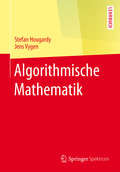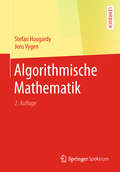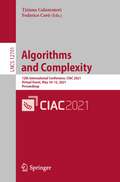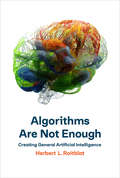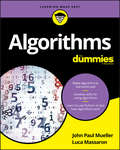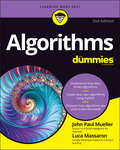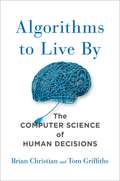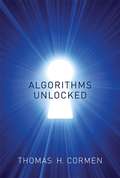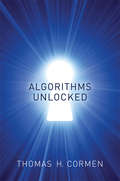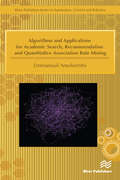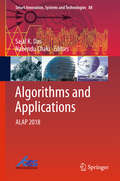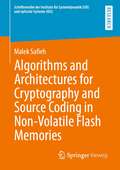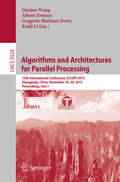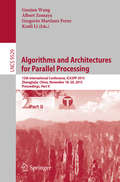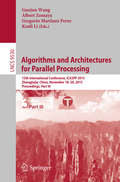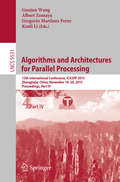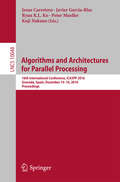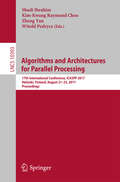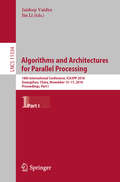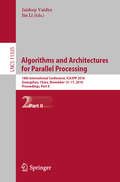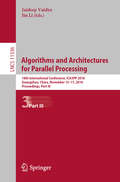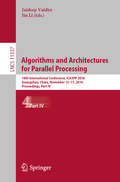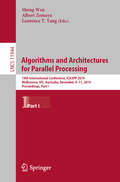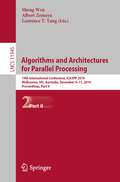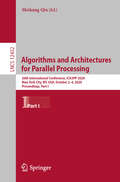- Table View
- List View
Algorithmische Mathematik (Springer-Lehrbuch)
by Stefan Hougardy Jens VygenDieses Lehrbuch vermittelt grundlegende mathematische Fähigkeiten im Hinblick auf Entwurf und Analyse von Algorithmen, sowie deren Implementierung. Neben einigen fundamentalen Algorithmen (z. B. Sieb des Eratosthenes, Euklidischer Algorithmus, Sortieralgorithmen, Algorithmen auf Graphen, Gauß-Elimination) werden auch elementare Datenstrukturen, graphentheoretische Grundlagen und numerische Fragen behandelt. Zudem werden grundlegende Programmierkenntnisse vermittelt und es wird gezeigt, wie man Algorithmen in C++ implementiert. Das Buch eignet sich besonders für den Studienbeginn und stellt den klassischen Vorlesungen über Analysis und Lineare Algebra die Algorithmische Mathematik als dritte Grundvorlesung zur Seite. Diese Vorlesung haben die Autoren in den letzten Jahren mehrfach an der Universität Bonn gehalten.
Algorithmische Mathematik (Springer-Lehrbuch)
by Stefan Hougardy Jens VygenAlgorithmen spielen eine immer wichtigere Rolle in fast allen Bereichen der Mathematik.Dieses Lehrbuch eignet sich für den Studienbeginn und stellt den klassischen Vorlesungen über Analysis und Lineare Algebra eine dritte mathematische Grundvorlesung zur Seite, die die Autoren in den letzten Jahren mehrfach an der Universität Bonn gehalten haben.Ziel dieses Buches ist die Vermittlung grundlegender mathematischer Fähigkeiten, besonders im Hinblick auf Entwurf und Analyse von Algorithmen, sowie deren Implementierung. Neben einigen fundamentalen Algorithmen (z.B. Sieb des Eratosthenes, Euklidischer Algorithmus, Sortieralgorithmen, Algorithmen auf Graphen, Gauß-Elimination) werden auch elementare Datenstrukturen, graphentheoretische Grundlagen und numerische Fragen behandelt.Zudem werden grundlegende Programmierkenntnisse vermittelt, und es wird gezeigt, wie man Algorithmen in C++ implementiert.In dieser Neuauflage sind mehr als 150 Übungsaufgaben hinzugefügt worden.
Algorithms and Complexity: 12th International Conference, CIAC 2021, Virtual Event, May 10–12, 2021, Proceedings (Lecture Notes in Computer Science #12701)
by Tiziana Calamoneri Federico CoròThis book constitutes the refereed conference proceedings of the 12th International Conference on Algorithms and Complexity, CIAC 2019, held as a virtual event, in May 2021. The 28 full papers presented together with one invited lecture and 2 two abstracts of invited lectures were carefully reviewed and selected from 78 submissions. The International Conference on Algorithms and Complexity is intended to provide a forum for researchers working in all aspects of computational complexity and the use, design, analysis and experimentation of efficient algorithms and data structures. The papers present original research in the theory and applications of algorithms and computational complexity.Due to the Corona pandemic the conference was held virtually.
Algorithms Are Not Enough: Creating General Artificial Intelligence
by Herbert L. RoitblatWhy a new approach is needed in the quest for general artificial intelligence.Since the inception of artificial intelligence, we have been warned about the imminent arrival of computational systems that can replicate human thought processes. Before we know it, computers will become so intelligent that humans will be lucky to kept as pets. And yet, although artificial intelligence has become increasingly sophisticated--with such achievements as driverless cars and humanless chess-playing--computer science has not yet created general artificial intelligence. In Algorithms Are Not Enough, Herbert Roitblat explains how artificial general intelligence may be possible and why a robopocalypse is neither imminent, nor likely.
Algorithms For Dummies
by John Paul Mueller Luca MassaronDiscover how algorithms shape and impact our digital world All data, big or small, starts with algorithms. Algorithms are mathematical equations that determine what we see—based on our likes, dislikes, queries, views, interests, relationships, and more—online. They are, in a sense, the electronic gatekeepers to our digital, as well as our physical, world. This book demystifies the subject of algorithms so you can understand how important they are business and scientific decision making. Algorithms for Dummies is a clear and concise primer for everyday people who are interested in algorithms and how they impact our digital lives. Based on the fact that we already live in a world where algorithms are behind most of the technology we use, this book offers eye-opening information on the pervasiveness and importance of this mathematical science—how it plays out in our everyday digestion of news and entertainment, as well as in its influence on our social interactions and consumerism. Readers even learn how to program an algorithm using Python! Become well-versed in the major areas comprising algorithms Examine the incredible history behind algorithms Get familiar with real-world applications of problem-solving procedures Experience hands-on development of an algorithm from start to finish with Python If you have a nagging curiosity about why an ad for that hammock you checked out on Amazon is appearing on your Facebook page, you'll find Algorithm for Dummies to be an enlightening introduction to this integral realm of math, science, and business.
Algorithms For Dummies
by John Paul Mueller Luca MassaronYour secret weapon to understanding—and using!—one of the most powerful influences in the world today From your Facebook News Feed to your most recent insurance premiums—even making toast!—algorithms play a role in virtually everything that happens in modern society and in your personal life. And while they can seem complicated from a distance, the reality is that, with a little help, anyone can understand—and even use—these powerful problem-solving tools! In Algorithms For Dummies, you'll discover the basics of algorithms, including what they are, how they work, where you can find them (spoiler alert: everywhere!), who invented the most important ones in use today (a Greek philosopher is involved), and how to create them yourself. You'll also find: Dozens of graphs and charts that help you understand the inner workings of algorithms Links to an online repository called GitHub for constant access to updated code Step-by-step instructions on how to use Google Colaboratory, a zero-setup coding environment that runs right from your browser Whether you're a curious internet user wondering how Google seems to always know the right answer to your question or a beginning computer science student looking for a head start on your next class, Algorithms For Dummies is the can't-miss resource you've been waiting for.
Algorithms To Live By: What Computers Can Teach Us About Solving Human Problems
by Brian Christian Tom GriffithsA fascinating exploration of how insights from computer algorithms can be applied to our everyday lives, helping to solve common decision-making problems and illuminate the workings of the human mind All our lives are constrained by limited space and time, limits that give rise to a particular set of problems. What should we do, or leave undone, in a day or a lifetime? How much messiness should we accept? What balance of new activities and familiar favorites is the most fulfilling? These may seem like uniquely human quandaries, but they are not: computers, too, face the same constraints, so computer scientists have been grappling with their version of such issues for decades. And the solutions they've found have much to teach us. In a dazzlingly interdisciplinary work, acclaimed author Brian Christian and cognitive scientist Tom Griffiths show how the algorithms used by computers can also untangle very human questions. They explain how to have better hunches and when to leave things to chance, how to deal with overwhelming choices and how best to connect with others. From finding a spouse to finding a parking spot, from organizing one's inbox to understanding the workings of memory, Algorithms to Live By transforms the wisdom of computer science into strategies for human living.
Algorithms Unlocked
by Thomas H. CormenHave you ever wondered how your GPS can find the fastest way to your destination, selecting one route from seemingly countless possibilities in mere seconds? How your credit card account number is protected when you make a purchase over the Internet? The answer is algorithms. And how do these mathematical formulations translate themselves into your GPS, your laptop, or your smart phone? This book offers an engagingly written guide to the basics of computer algorithms. In Algorithms Unlocked, Thomas Cormen -- coauthor of the leading college textbook on the subject -- provides a general explanation, with limited mathematics, of how algorithms enable computers to solve problems. Readers will learn what computer algorithms are, how to describe them, and how to evaluate them. They will discover simple ways to search for information in a computer; methods for rearranging information in a computer into a prescribed order ("sorting"); how to solve basic problems that can be modeled in a computer with a mathematical structure called a "graph" (useful for modeling road networks, dependencies among tasks, and financial relationships); how to solve problems that ask questions about strings of characters such as DNA structures; the basic principles behind cryptography; fundamentals of data compression; and even that there are some problems that no one has figured out how to solve on a computer in a reasonable amount of time.
Algorithms Unlocked
by Thomas H. CormenFor anyone who has ever wondered how computers solve problems, an engagingly written guide for nonexperts to the basics of computer algorithms.Have you ever wondered how your GPS can find the fastest way to your destination, selecting one route from seemingly countless possibilities in mere seconds? How your credit card account number is protected when you make a purchase over the Internet? The answer is algorithms. And how do these mathematical formulations translate themselves into your GPS, your laptop, or your smart phone? This book offers an engagingly written guide to the basics of computer algorithms. In Algorithms Unlocked, Thomas Cormen—coauthor of the leading college textbook on the subject—provides a general explanation, with limited mathematics, of how algorithms enable computers to solve problems.Readers will learn what computer algorithms are, how to describe them, and how to evaluate them. They will discover simple ways to search for information in a computer; methods for rearranging information in a computer into a prescribed order (“sorting”); how to solve basic problems that can be modeled in a computer with a mathematical structure called a “graph” (useful for modeling road networks, dependencies among tasks, and financial relationships); how to solve problems that ask questions about strings of characters such as DNA structures; the basic principles behind cryptography; fundamentals of data compression; and even that there are some problems that no one has figured out how to solve on a computer in a reasonable amount of time.
Algorithms and Applications for Academic Search, Recommendation and Quantitative Association Rule Mining (River Publishers Series In Automation, Control And Robotics Ser.)
by Emmanouil AmolochitisAlgorithms and Applications for Academic Search, Recommendation and Quantitative Association Rule Mining presents novel algorithms for academic search, recommendation and association rule mining that have been developed and optimized for different commercial as well as academic purpose systems. Along with the design and implementation of algorithms, a major part of the work presented in the book involves the development of new systems both for commercial as well as for academic use. In the first part of the book the author introduces a novel hierarchical heuristic scheme for re-ranking academic publications retrieved from standard digital libraries. The scheme is based on the hierarchical combination of a custom implementation of the term frequency heuristic, a time-depreciated citation score and a graph-theoretic computed score that relates the paper's index terms with each other. In order to evaluate the performance of the introduced algorithms, a meta-search engine has been designed and developed that submits user queries to standard digital repositories of academic publications and re-ranks the top-n results using the introduced hierarchical heuristic scheme. In the second part of the book the design of novel recommendation algorithms with application in different types of e-commerce systems are described. The newly introduced algorithms are a part of a developed Movie Recommendation system, the first such system to be commercially deployed in Greece by a major Triple Play services provider. The initial version of the system uses a novel hybrid recommender (user, item and content based) and provides daily recommendations to all active subscribers of the provider (currently more than 30,000). The recommenders that we are presenting are hybrid by nature, using an ensemble configuration of different content, user as well as item-based recommenders in order to provide more accurate recommendation results. The final part of the book presents the design of a quantitative association rule mining algorithm. Quantitative association rules refer to a special type of association rules of the form that antecedent implies consequent consisting of a set of numerical or quantitative attributes. The introduced mining algorithm processes a specific number of user histories in order to generate a set of association rules with a minimally required support and confidence value. The generated rules show strong relationships that exist between the consequent and the antecedent of each rule, representing different items that have been consumed at specific price levels. This research book will be of appeal to researchers, graduate students, professionals, engineers and computer programmers.
Algorithms and Applications: Alap 2018 (Smart Innovation, Systems And Technologies #88)
by Nabendu Chaki Sajal K. DasThis book presents the proceedings of the Conference on Algorithms and Applications (ALAP 2018), which focuses on various areas of computing, like distributed systems and security, big data and analytics and very-large-scale integration (VLSI) design. The book provides solutions to a broad class of problems in diverse areas of algorithms in our daily lives in a world designed for, and increasingly controlled by algorithms. Written by eminent personalities from academia and industry, the papers included offer insights from a number of perspectives, providing an overview of the state of the art in the field. The book consists of invited talks by respected speakers, papers presented in technical sessions, and tutorials to offer ideas, results, work-in-progress and experiences of various algorithmic aspects of computational science and engineering.
Algorithms and Architectures for Cryptography and Source Coding in Non-Volatile Flash Memories (Schriftenreihe der Institute für Systemdynamik (ISD) und optische Systeme (IOS))
by Malek SafiehIn this work, algorithms and architectures for cryptography and source coding are developed, which are suitable for many resource-constrained embedded systems such as non-volatile flash memories. A new concept for elliptic curve cryptography is presented, which uses an arithmetic over Gaussian integers. Gaussian integers are a subset of the complex numbers with integers as real and imaginary parts. Ordinary modular arithmetic over Gaussian integers is computational expensive. To reduce the complexity, a new arithmetic based on the Montgomery reduction is presented. For the elliptic curve point multiplication, this arithmetic over Gaussian integers improves the computational efficiency, the resistance against side channel attacks, and reduces the memory requirements. Furthermore, an efficient variant of the Lempel-Ziv-Welch (LZW) algorithm for universal lossless data compression is investigated. Instead of one LZW dictionary, this algorithm applies several dictionaries to speed up the encoding process. Two dictionary partitioning techniques are introduced that improve the compression rate and reduce the memory size of this parallel dictionary LZW algorithm.
Algorithms and Architectures for Parallel Processing: 15th International Conference, ICA3PP 2015, Zhangjiajie, China, November 18-20, 2015, Proceedings, Part I (Lecture Notes in Computer Science #9528)
by Albert Zomaya Guojun Wang Gregorio Martinez Perez Kenli LiThis fourvolume set LNCS 9528, 9529, 9530 and 9531 constitutes the refereed proceedingsof the 15th International Conference on Algorithms and Architectures for ParallelProcessing, ICA3PP 2015, held in Zhangjiajie, China, in November 2015. The 219revised full papers presented together with 77 workshop papers in these fourvolumes were carefully reviewed and selected from 807 submissions (602 fullpapers and 205 workshop papers). The first volume comprises the followingtopics: parallel and distributed architectures; distributed and network-basedcomputing and internet of things and cyber-physical-social computing. Thesecond volume comprises topics such as big data and its applications andparallel and distributed algorithms. The topics of the third volume are:applications of parallel and distributed computing and service dependabilityand security in distributed and parallel systems. The covered topics of the fourthvolume are: software systems and programming models and performance modelingand evaluation.
Algorithms and Architectures for Parallel Processing: 15th International Conference, ICA3PP 2015, Zhangjiajie, China, November 18-20, 2015, Proceedings, Part II (Lecture Notes in Computer Science #9529)
by Albert Zomaya Guojun Wang Gregorio Martinez Perez Kenli LiThis book constitutes the refereed proceedings of the Workshops and Symposiums of the 15th International Conference on Algorithms and Architectures for Parallel Processing, ICA3PP 2015, held in Zhangjiajie, China, in November 2015.<P><P> The program of this year consists of 6 symposiums/workshops that cover a wide range of research topics on parallel processing technology: the Sixth International Workshop on Trust, Security and Privacy for Big Data, TrustData 2015; the Fifth International Symposium on Trust, Security and Privacy for Emerging Applications, TSP 2015; the Third International Workshop on Network Optimization and Performance Evaluation, NOPE 2015; the Second International Symposium on Sensor-Cloud Systems, SCS 2015; the Second International Workshop on Security and Privacy Protection in Computer and Network Systems, SPPCN 2015; and the First International Symposium on Dependability in Sensor, Cloud, and Big Data Systems and Applications, DependSys 2015.<P> The aim of these symposiums/workshops is to provide a forum to bring together practitioners and researchers from academia and industry for discussion and presentations on the current research and future directions related to parallel processing technology. The themes and topics of these symposiums/workshops are a valuable complement to the overall scope of ICA3PP 2015 and give additional values and interests.
Algorithms and Architectures for Parallel Processing: 15th International Conference, ICA3PP 2015, Zhangjiajie, China, November 18-20, 2015, Proceedings, Part III (Lecture Notes in Computer Science #9530)
by Albert Zomaya Guojun Wang Gregorio Martinez Perez Kenli LiThis four volume set LNCS 9528, 9529, 9530 and 9531 constitutes the refereed proceedings of the 15th International Conference on Algorithms and Architectures for Parallel Processing, ICA3PP 2015, held in Zhangjiajie, China, in November 2015.<P><P> The 219 revised full papers presented together with 77 workshop papers in these four volumes were carefully reviewed and selected from 807 submissions (602 full papers and 205 workshop papers). The first volume comprises the following topics: parallel and distributed architectures; distributed and network-based computing and internet of things and cyber-physical-social computing. The second volume comprises topics such as big data and its applications and parallel and distributed algorithms. The topics of the third volume are: applications of parallel and distributed computing and service dependability and security in distributed and parallel systems. The covered topics of the fourth volume are: software systems and programming models and performance modeling and evaluation.
Algorithms and Architectures for Parallel Processing: 15th International Conference, ICA3PP 2015, Zhangjiajie, China, November 18-20, 2015, Proceedings, Part IV (Lecture Notes in Computer Science #9531)
by Albert Zomaya Guojun Wang Gregorio Martinez Perez Kenli LiThis four volume set LNCS 9528, 9529, 9530 and 9531 constitutes the refereed proceedings of the 15th International Conference on Algorithms and Architectures for Parallel Processing, ICA3PP 2015, held in Zhangjiajie, China, in November 2015.<P><P> The 219 revised full papers presented together with 77 workshop papers in these four volumes were carefully reviewed and selected from 807 submissions (602 full papers and 205 workshop papers). The first volume comprises the following topics: parallel and distributed architectures; distributed and network-based computing and internet of things and cyber-physical-social computing. The second volume comprises topics such as big data and its applications and parallel and distributed algorithms. The topics of the third volume are: applications of parallel and distributed computing and service dependability and security in distributed and parallel systems. The covered topics of the fourth volume are: software systems and programming models and performance modeling and evaluation.
Algorithms and Architectures for Parallel Processing: 16th International Conference, ICA3PP 2016, Granada, Spain, December 14-16, 2016, Proceedings (Lecture Notes in Computer Science #10048)
by Peter Mueller Jesus Carretero Javier Garcia-Blas Ryan K.L. Ko Koji NakanoThis book constitutes the refereed proceedings of the 16th International Conference on Algorithms and Architectures for Parallel Processing, ICA3PP 2016, held in Granada, Spain, in December 2016. The 30 full papers and 22 short papers presented were carefully reviewed and selected from 117 submissions. They cover many dimensions of parallel algorithms and architectures, encompassing fundamental theoretical approaches, practical experimental projects, and commercial components and systems trying to push beyond the limits of existing technologies, including experimental efforts, innovative systems, and investigations that identify weaknesses in existing parallel processing technology.
Algorithms and Architectures for Parallel Processing: 17th International Conference, ICA3PP 2017, Helsinki, Finland, August 21-23, 2017, Proceedings (Lecture Notes in Computer Science #10393)
by Witold Pedrycz Kim-Kwang Raymond Choo Zheng Yan Shadi IbrahimThis book constitutes the proceedings of the 17th International Conference on Algorithms and Architectures for Parallel Processing, ICA3PP 2017, held in Helsinki, Finland, in August 2017. The 25 full papers presented were carefully reviewed and selected from 117 submissions. They cover topics such as parallel and distributed architectures; software systems and programming models; distributed and network-based computing; big data and its applications; parallel and distributed algorithms; applications of parallel and distributed computing; service dependability and security in distributed and parallel systems; service dependability and security in distributed and parallel systems; performance modeling and evaluation. This volume also includes 41 papers of four workshops, namely: the 4th International Workshop on Data, Text, Web, and Social Network Mining (DTWSM 2017), the 5th International Workshop on Parallelism in Bioinformatics (PBio 2017) , the First International Workshop on Distributed Autonomous Computing in Smart City (DACSC 2017), and the Second International Workshop on Ultrascale Computing for Early Researchers (UCER 2017).
Algorithms and Architectures for Parallel Processing: 18th International Conference, ICA3PP 2018, Guangzhou, China, November 15-17, 2018, Proceedings, Part I (Lecture Notes in Computer Science #11334)
by Jin Li Jaideep VaidyaThe four-volume set LNCS 11334-11337 constitutes the proceedings of the 18th International Conference on Algorithms and Architectures for Parallel Processing, ICA3PP 2018, held in Guangzhou, China, in November 2018. The 141 full and 50 short papers presented were carefully reviewed and selected from numerous submissions. The papers are organized in topical sections on Distributed and Parallel Computing; High Performance Computing; Big Data and Information Processing; Internet of Things and Cloud Computing; and Security and Privacy in Computing.
Algorithms and Architectures for Parallel Processing: 18th International Conference, ICA3PP 2018, Guangzhou, China, November 15-17, 2018, Proceedings, Part II (Lecture Notes in Computer Science #11335)
by Jin Li Jaideep VaidyaThe four-volume set LNCS 11334-11337 constitutes the proceedings of the 18th International Conference on Algorithms and Architectures for Parallel Processing, ICA3PP 2018, held in Guangzhou, China, in November 2018. The 141 full and 50 short papers presented were carefully reviewed and selected from numerous submissions. The papers are organized in topical sections on Distributed and Parallel Computing; High Performance Computing; Big Data and Information Processing; Internet of Things and Cloud Computing; and Security and Privacy in Computing.
Algorithms and Architectures for Parallel Processing: 18th International Conference, ICA3PP 2018, Guangzhou, China, November 15-17, 2018, Proceedings, Part III (Lecture Notes in Computer Science #11336)
by Jin Li Jaideep VaidyaThe four-volume set LNCS 11334-11337 constitutes the proceedings of the 18th International Conference on Algorithms and Architectures for Parallel Processing, ICA3PP 2018, held in Guangzhou, China, in November 2018. The 141 full and 50 short papers presented were carefully reviewed and selected from numerous submissions. The papers are organized in topical sections on Distributed and Parallel Computing; High Performance Computing; Big Data and Information Processing; Internet of Things and Cloud Computing; and Security and Privacy in Computing.
Algorithms and Architectures for Parallel Processing: 18th International Conference, ICA3PP 2018, Guangzhou, China, November 15-17, 2018, Proceedings, Part IV (Lecture Notes in Computer Science #11337)
by Jin Li Jaideep VaidyaThe four-volume set LNCS 11334-11337 constitutes the proceedings of the 18th International Conference on Algorithms and Architectures for Parallel Processing, ICA3PP 2018, held in Guangzhou, China, in November 2018. The 141 full and 50 short papers presented were carefully reviewed and selected from numerous submissions. The papers are organized in topical sections on Distributed and Parallel Computing; High Performance Computing; Big Data and Information Processing; Internet of Things and Cloud Computing; and Security and Privacy in Computing.
Algorithms and Architectures for Parallel Processing: 19th International Conference, ICA3PP 2019, Melbourne, VIC, Australia, December 9–11, 2019, Proceedings, Part I (Lecture Notes in Computer Science #11944)
by Albert Zomaya Laurence T. Yang Sheng WenThe two-volume set LNCS 11944-11945 constitutes the proceedings of the 19th International Conference on Algorithms and Architectures for Parallel Processing, ICA3PP 2019, held in Melbourne, Australia, in December 2019. The 73 full and 29 short papers presented were carefully reviewed and selected from 251 submissions. The papers are organized in topical sections on: Parallel and Distributed Architectures, Software Systems and Programming Models, Distributed and Parallel and Network-based Computing, Big Data and its Applications, Distributed and Parallel Algorithms, Applications of Distributed and Parallel Computing, Service Dependability and Security, IoT and CPS Computing, Performance Modelling and Evaluation.
Algorithms and Architectures for Parallel Processing: 19th International Conference, ICA3PP 2019, Melbourne, VIC, Australia, December 9–11, 2019, Proceedings, Part II (Lecture Notes in Computer Science #11945)
by Albert Zomaya Laurence T. Yang Sheng WenThe two-volume set LNCS 11944-11945 constitutes the proceedings of the 19th International Conference on Algorithms and Architectures for Parallel Processing, ICA3PP 2019, held in Melbourne, Australia, in December 2019. The 73 full and 29 short papers presented were carefully reviewed and selected from 251 submissions. The papers are organized in topical sections on: Parallel and Distributed Architectures, Software Systems and Programming Models, Distributed and Parallel and Network-based Computing, Big Data and its Applications, Distributed and Parallel Algorithms, Applications of Distributed and Parallel Computing, Service Dependability and Security, IoT and CPS Computing, Performance Modelling and Evaluation.
Algorithms and Architectures for Parallel Processing: 20th International Conference, ICA3PP 2020, New York City, NY, USA, October 2–4, 2020, Proceedings, Part I (Lecture Notes in Computer Science #12452)
by Meikang QiuThis three-volume set LNCS 12452, 12453, and 12454 constitutes the proceedings of the 20th International Conference on Algorithms and Architectures for Parallel Processing, ICA3PP 2020, in New York City, NY, USA, in October 2020.The total of 142 full papers and 5 short papers included in this proceedings volumes was carefully reviewed and selected from 495 submissions. ICA3PP is covering the many dimensions of parallel algorithms and architectures, encompassing fundamental theoretical approaches, practical experimental projects, and commercial components and systems. As applications of computing systems have permeated in every aspects of daily life, the power of computing system has become increasingly critical. This conference provides a forum for academics and practitioners from countries around the world to exchange ideas for improving the efficiency, performance, reliability, security and interoperability of computing systems and applications. ICA3PP 2020 focus on two broad areas of parallel and distributed computing, i.e. architectures, algorithms and networks, and systems and applications.
